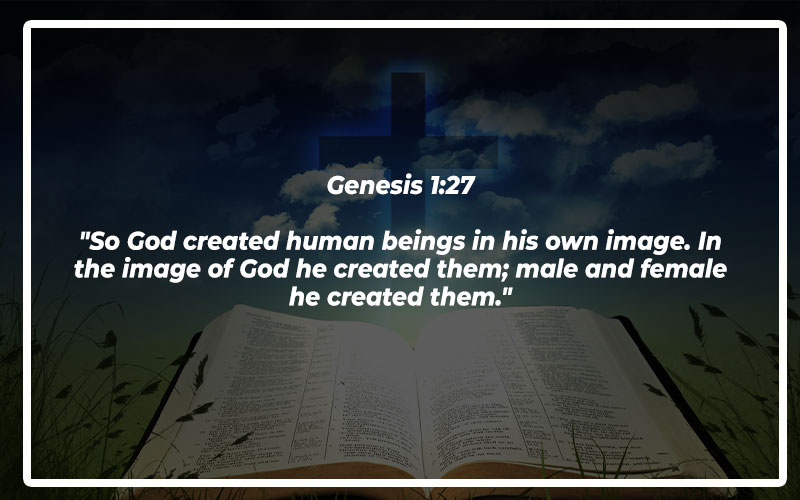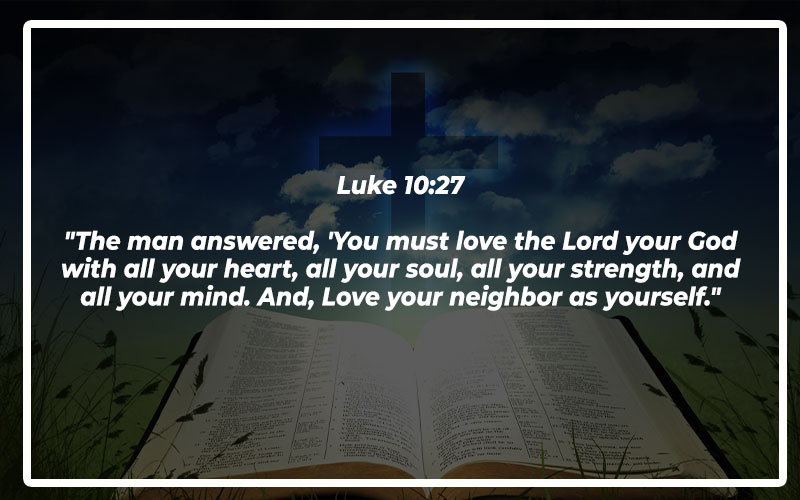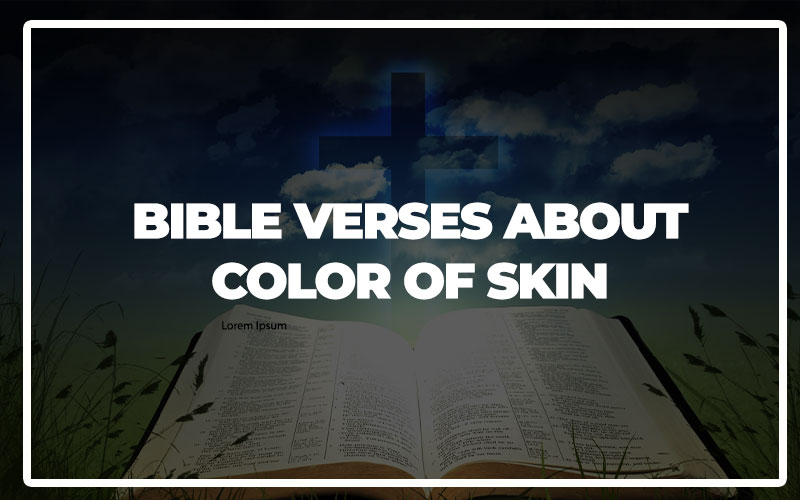The Bible offers a powerful message about the value and equality of every person, regardless of their skin color.
From the beginning, it teaches that all people are created in God’s image, highlighting our shared humanity and worth.
Verses throughout both the Old and New Testaments emphasize unity, love, and equality, making it clear that physical differences like skin color are insignificant in God’s eyes. Instead, the focus is on our hearts and actions.
This article explores key Bible verses that affirm the dignity and equality of all people, reminding us of the divine love and unity we share. Do read on!
Also Read: Bible Verses About Acceptance
Top Bible Verses About Color of Skin
Genesis 1:27
“So God created human beings in his own image. In the image of God he created them; male and female he created them.”

This verse emphasizes the inherent dignity and worth of every human being, regardless of the color of their skin. Since all people are created in the image of God, it follows that racial differences are a part of God’s divine design and should be respected and celebrated.
1 Samuel 16:7
“But the Lord said to Samuel, ‘Don’t judge by his appearance or height, for I have rejected him. The Lord doesn’t see things the way you see them. People judge by outward appearance, but the Lord looks at the heart.'”
This verse teaches that God values the inner character of a person over their external appearance. It challenges us to look beyond the color of a person’s skin and to value individuals based on their heart and actions.
John 7:24
“Look beneath the surface so you can judge correctly.”
Jesus instructs us to go beyond superficial judgments and to assess people based on their true character and actions. This applies to all aspects of life, including how we view and treat people of different races and ethnicities.
Acts 17:26
“From one man he created all the nations throughout the whole earth. He decided beforehand when they should rise and fall, and he determined their boundaries.”
This verse highlights the unity of humanity, stating that all nations and races have a common origin in God’s creation. This underlines the idea that racial diversity is a part of God’s plan and should be embraced.
Galatians 3:28
“There is no longer Jew or Gentile, slave or free, male and female. For you are all one in Christ Jesus.”
This verse underscores the spiritual equality of all believers in Christ. In Jesus, distinctions of race, social status, and gender are transcended, emphasizing the unity and equality of all Christians.
James 2:9
“But if you favor some people over others, you are committing a sin. You are guilty of breaking the law.”
This verse condemns favoritism and partiality, reminding believers that such actions are sinful. It calls for equal treatment of all people, regardless of their race or ethnicity.
Romans 2:11
“For God does not show favoritism.”
This simple yet powerful statement emphasizes God’s impartiality. It serves as a model for how we should treat others, striving to reflect God’s fairness and equality in our interactions with people of all races.
Colossians 3:11
“In this new life, it doesn’t matter if you are a Jew or a Gentile, circumcised or uncircumcised, barbaric, uncivilized, slave, or free. Christ is all that matters, and he lives in all of us.”
This verse highlights the inclusivity of the Christian faith. It stresses that in Christ, traditional social and racial distinctions are irrelevant, fostering a sense of unity and equality among believers.
Revelation 7:9
“After this I saw a vast crowd, too great to count, from every nation and tribe and people and language, standing in front of the throne and before the Lamb. They were clothed in white robes and held palm branches in their hands.”
This vision of heaven depicts a diverse multitude worshipping together, emphasizing the inclusivity of God’s kingdom. It serves as a reminder that all races and ethnicities are valued and have a place in God’s eternal plan.
Proverbs 22:2
“The rich and poor have this in common: The Lord made them both.”
This verse highlights the common origin of all people, regardless of their social or economic status. It implies that racial and economic differences should not be grounds for discrimination or division, as we are all created by God.
Isaiah 56:7
“I will bring them to my holy mountain of Jerusalem and will fill them with joy in my house of prayer. I will accept their burnt offerings and sacrifices, because my Temple will be called a house of prayer for all nations.”
This verse speaks to the inclusivity of God’s house, welcoming people from all nations. It reinforces the idea that God values and accepts worship from people of all races and ethnicities.
Matthew 28:19
“Therefore, go and make disciples of all the nations, baptizing them in the name of the Father and the Son and the Holy Spirit.”
Jesus’ Great Commission emphasizes the global scope of the Gospel. It calls for making disciples of all nations, highlighting the importance of reaching out to and including people of every race and ethnicity in the Christian mission.
1 Corinthians 12:13
“Some of us are Jews, some are Gentiles, some are slaves, and some are free. But we have all been baptized into one body by one Spirit, and we all share the same Spirit.”
This verse speaks to the unity and diversity within the body of Christ. It acknowledges differences in background but emphasizes that all believers are united through the Holy Spirit.
Ephesians 2:14
“For Christ himself has brought peace to us. He united Jews and Gentiles into one people when, in his own body on the cross, he broke down the wall of hostility that separated us.”
This verse highlights the reconciling work of Christ, who breaks down barriers between different racial and ethnic groups. It underscores the peace and unity that should characterize the relationships among believers.
Also Read: Bible Verses About Brotherly Love
Galatians 5:14
“For the whole law can be summed up in this one command: ‘Love your neighbor as yourself.'”
This foundational commandment calls for love and respect for all people. It challenges believers to extend love to everyone, regardless of racial or ethnic differences, promoting harmony and understanding.
Micah 6:8
“No, O people, the Lord has told you what is good, and this is what he requires of you: to do what is right, to love mercy, and to walk humbly with your God.”
This verse outlines God’s expectations for his people, including justice and mercy. It calls for fair and compassionate treatment of all people, which includes recognizing and addressing racial injustices.
Zechariah 7:9-10
“This is what the Lord of Heaven’s Armies says: Judge fairly, and show mercy and kindness to one another. Do not oppress widows, orphans, foreigners, and the poor. And do not scheme against each other.”
These verses emphasize the importance of justice and mercy in our interactions with others. They call for fair treatment and kindness toward all people, including foreigners and the marginalized, which speaks against racial discrimination.
Leviticus 19:33-34
“Do not take advantage of foreigners who live among you in your land. Treat them like native-born Israelites, and love them as you love yourself. Remember that you were once foreigners living in the land of Egypt. I am the Lord your God.”
This command instructs the Israelites to treat foreigners with the same love and respect as their own people. It serves as a timeless principle for treating people of all races and backgrounds with dignity and love.
Psalm 67:1-2
“May God be merciful and bless us. May his face smile with favor on us. May your ways be known throughout the earth, your saving power among people everywhere.”
This prayer for God’s blessing extends to all people everywhere, emphasizing the universal scope of God’s mercy and salvation. It reflects the desire for God’s goodness to be known and experienced by people of every race and nation.
John 13:34-35
“So now I am giving you a new commandment: Love each other. Just as I have loved you, you should love each other. Your love for one another will prove to the world that you are my disciples.”
Jesus’ command to love one another is a powerful testament to the world. This love should transcend racial and ethnic boundaries, demonstrating the unity and compassion that characterize true disciples of Christ.
Romans 10:12
“Jew and Gentile are the same in this respect. They have the same Lord, who gives generously to all who call on him.”
This verse emphasizes the equality of all people in their relationship with God. It affirms that God’s generosity and salvation are available to everyone, regardless of their racial or ethnic background.
1 John 2:9-10
“If anyone claims, ‘I am living in the light,’ but hates a fellow believer, that person is still living in darkness. Anyone who loves a fellow believer is living in the light and does not cause others to stumble.”
These verses highlight the importance of love among believers. Hatred, including racial prejudice, is incompatible with living in the light of Christ. True love and acceptance should define the relationships within the Christian community.
Matthew 5:14-16
“You are the light of the world—like a city on a hilltop that cannot be hidden. No one lights a lamp and then puts it under a basket. Instead, a lamp is placed on a stand, where it gives light to everyone in the house. In the same way, let your good deeds shine out for all to see, so that everyone will praise your heavenly Father.”
Jesus calls his followers to be a visible and positive influence in the world. Our actions, including how we treat people of different races, should reflect God’s love and justice, drawing others to Him.
Romans 12:10
“Love each other with genuine affection, and take delight in honoring each other.”
This verse encourages sincere love and honor among believers. It calls for a deep and respectful love that transcends racial and ethnic differences, fostering unity and mutual respect within the Christian community.
1 Peter 2:9
“But you are not like that, for you are a chosen people. You are royal priests, a holy nation, God’s very own possession. As a result, you can show others the goodness of God, for he called you out of the darkness into his wonderful light.”
This verse speaks to the identity and calling of God’s people. It highlights their role in reflecting God’s goodness to the world, which includes promoting justice, equality, and love for all people.
James 3:17
“But the wisdom from above is first of all pure. It is also peace loving, gentle at all times, and willing to yield to others. It is full of mercy and good deeds. It shows no favoritism and is always sincere.”
This verse describes the characteristics of godly wisdom, which includes impartiality and sincerity. It calls for attitudes and actions that promote peace and justice, rejecting favoritism and discrimination.
Matthew 5:43-44
“You have heard the law that says, ‘Love your neighbor’ and hate your enemy. But I say, love your enemies! Pray for those who persecute you!”
Jesus’ teaching extends the command to love even to our enemies. This radical love challenges racial prejudices and calls for prayers and love for all people, regardless of how they may have treated us.
1 John 4:20
“If someone says, ‘I love God,’ but hates a fellow believer, that person is a liar; for if we don’t love people we can see, how can we love God, whom we cannot see?”
This verse strongly condemns hypocrisy in love. True love for God must be demonstrated through love for others, including those of different races. Hatred towards others is incompatible with genuine love for God.
Luke 10:27
“The man answered, ‘You must love the Lord your God with all your heart, all your soul, all your strength, and all your mind. And, Love your neighbor as yourself.”

This verse reiterates the greatest commandments, emphasizing love for God and for others. Loving our neighbor as ourselves includes treating people of all races with the same respect and care we desire for ourselves.
Matthew 25:40
“And the King will say, ‘I tell you the truth, when you did it to one of the least of these my brothers and sisters, you were doing it to me!'”
Jesus identifies Himself with the marginalized and vulnerable. How we treat the least among us, including those who may be racially or socially marginalized, is a reflection of our love for Christ.
Hebrews 13:1-2
“Keep on loving each other as brothers and sisters. Don’t forget to show hospitality to strangers, for some who have done this have entertained angels without realizing it!”
This passage calls for ongoing love and hospitality, even to strangers. It highlights the importance of welcoming and valuing people of different backgrounds, recognizing the potential divine encounters in our interactions with others.
Philippians 2:3-4
“Don’t be selfish; don’t try to impress others. Be humble, thinking of others as better than yourselves. Don’t look out only for your own interests, but take an interest in others, too.”
This verse encourages humility and selflessness. It calls believers to value others and consider their needs, promoting an attitude of respect and care that transcends racial and ethnic boundaries.
Romans 15:7
“Therefore, accept each other just as Christ has accepted you so that God will be given glory.”
This verse emphasizes acceptance among believers, mirroring the acceptance we have received from Christ. It encourages an inclusive and welcoming attitude towards all people, regardless of their racial or ethnic background.
1 Corinthians 13:4-7
“Love is patient and kind. Love is not jealous or boastful or proud or rude. It does not demand its own way. It is not irritable, and it keeps no record of being wronged. It does not rejoice about injustice but rejoices whenever the truth wins out. Love never gives up, never loses faith, is always hopeful, and endures through every circumstance.”
This passage defines the nature of true love, which includes patience, kindness, and a commitment to justice and truth. It calls for a love that transcends all barriers, including those of race and ethnicity, fostering unity and understanding.
Also Read: Bible Verses About Changing Your Mindset
What Does the Bible Say About Color of Skin
The Bible is a timeless text that transcends human differences, including the color of skin. Throughout its pages, the emphasis is consistently placed on the unity and equality of all people under God, rather than on physical attributes such as skin color.
In Genesis, humanity’s creation is described without reference to race or color: “So God created man in His own image; in the image of God He created him; male and female He created them” (Genesis 1:27). This verse underscores the belief that every human being is made in the image of God, affirming the inherent worth and dignity of every person, regardless of their physical appearance.
The New Testament further reinforces this theme of unity and equality. In Acts 17:26, it is stated, “And He has made from one blood every nation of men to dwell on all the face of the earth, and has determined their preappointed times and the boundaries of their dwellings.” This passage highlights the common origin and shared humanity of all people, emphasizing that we are all part of the same human family.
The apostle Paul, in his letters, continually advocates for unity and love among believers. In Galatians 3:28, he writes, “There is neither Jew nor Greek, there is neither slave nor free, there is neither male nor female; for you are all one in Christ Jesus.” This powerful statement abolishes divisions based on race, social status, or gender, declaring that in Christ, all are equal.
Moreover, the Book of Revelation provides a vision of a diverse and unified worship in heaven. Revelation 7:9 describes a great multitude “from every nation, tribe, people, and language, standing before the throne and before the Lamb.” This vision celebrates the beauty of diversity within the unity of God’s kingdom.
Finally, the Bible does not focus on the color of skin but rather on the heart and character of individuals. It teaches that all people are created in God’s image and calls for love, unity, and equality among all humanity. The message is clear: in God’s eyes, we are all valued and loved, irrespective of our outward appearances.

